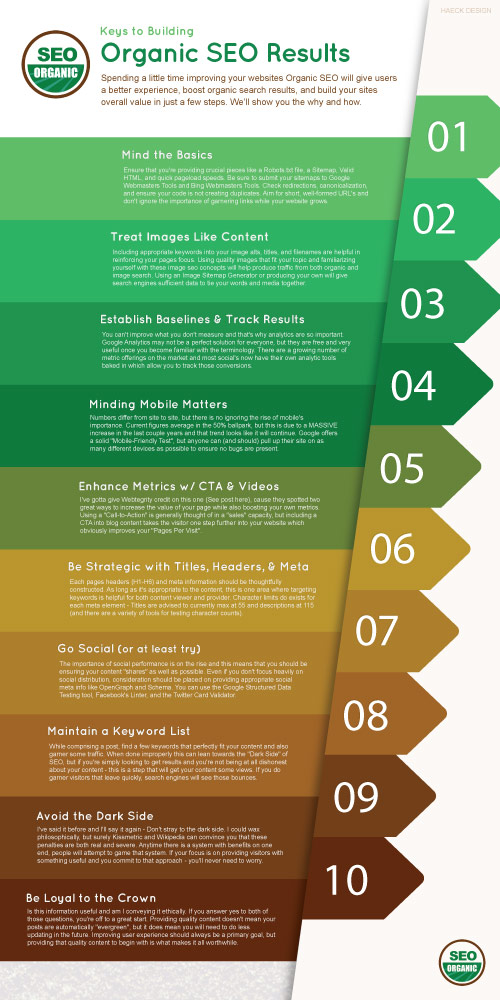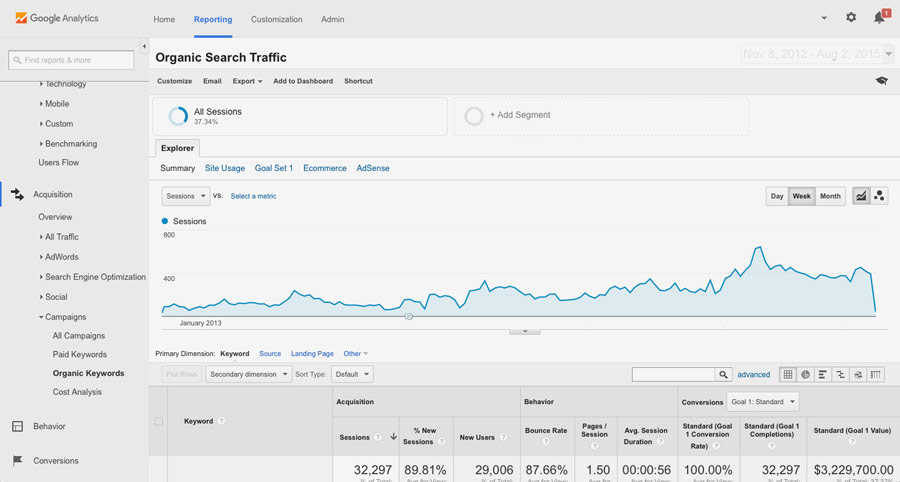With the rise of paid ads and social traffic, Organic SEO has taken a back seat to many digital marketing companies. Although trends may be pushing against organic search, growing companies should see this opportunity for what it is.
Search Engine Optimization (SEO) is all about improving traffic, but the source of that traffic is of key importance. A clear distinction should be made between content that aims to be hot and content that aims to be helpful. While obtaining "viral success" has its advantages, virality itself may have become a bit overblown. Whether you think organic search is a compliment, a foundation, or you haven't picked sides - the rules are simple and a growing company should really consider the value these dividends can pay.
What is Organic SEO & How is it Different?

When people use a search engine, they're hoping to answer a question. That question is the variable and Google constantly refines their algorithm to make achieving quality answers more likely. This means every website owner should see one of their primary goals as a provider of answers. The more answers you provide, the more value your site ultimately holds. The key to success in organic search is in providing quality content, in an efficient manner that answers questions. When you provide that quality content and set up a few key indicators, you should see a rise in the natural placement on organic search engine results and therefore traffic. This isn't the kind of traffic that creates spikes, but it is the kind that raises baselines.
There isn't really any aspect of organic SEO that's revolutionary. It's more about doing the basics well and letting the rest take care of itself. Whereas SEO is simply about providing results, I'd say that the primary focus of organic is on providing the quality. When you're working with a client or building a website on your own, arguing for this "slow and steady" method can be a challenge. Like most technical work clients expect results, but providing fast results in SEO usually means shooting yourself in the foot for the long-term. This chase for short-term results ultimately harms both the website and the brand as a whole. Optimizing for organic search is a marathon, but ultimately it's a victory that pays off for visitors and the brand long after any work has been completed.
Keys to Building Natural SEO Results
The guiding principal in optimizing for natural search is simple. Ask yourself two questions - 1) Am I providing something useful to the viewer? and 2) Am I being ethical in my delivery? It could be argued that the word "ethical" is pretty grey, but when the long-term viability of a brand is on the line it's important to clear this grey up. Many of these keys are simple and common sense, but they're all important. With that in mind, here are a our top ten tips (in order of increasing importance) for boosting organic SEO, both now and in the distant future.
- Mind the Basics: Ensure that you're providing crucial pieces like a Robots.txt file, a Sitemap, Valid HTML, and quick pageload speeds. Be sure to submit your sitemaps to Google Webmasters Tools and Bing Webmasters Tools. Check redirections, canonicalization, and ensure your code is not creating duplicates. Aim for short, well-formed URL's and don't ignore the importance of garnering links while your website grows.
- Treat Images Like Content: Including appropriate keywords into your image alts, titles, and filenames are helpful in reinforcing your pages focus. Using quality images that fit your topic and familiarizing yourself with these image seo concepts will help produce traffic from both organic and image search. Using an Image Sitemap Generator or producing your own will give search engines sufficient data to tie your words and media together. If you notice other sites using your images, there are a few "Hotlink Prevention" methods that can shut that annoyance down.
- Establish Baselines & Track Results: You can't improve what you don't measure and that's why analytics are so important. Google Analytics may not be a perfect solution for everyone, but they are free and very useful once you become familiar with the terminology. There are a growing number of metric offerings on the market (like Clicky & Heap) and most social's now have their own analytic tools baked in which allow you to track those conversions. The point is - You must be measuring performance in order to get a real assessment of how changes in approach affect traffic.
- Minding Mobile Matters: Numbers differ from site to site, but there is no ignoring the rise of mobile's importance. Current figures average in the 50% ballpark, but this is due to a MASSIVE increase in the last couple years and that trend looks like it will continue. Google offers a solid "Mobile-Friendly Test", but anyone can (and should) pull up their site on as many different devices as possible to ensure no bugs are present.
- Enhance Metrics w/ CTA & Videos: I've gotta give Webtegrity credit on this one, cause they spotted two great ways to increase the value of your page while also boosting your own metrics. Using a "Call-to-Action" is generally thought of in a "sales" capacity, but including a CTA into blog content takes the visitor one step further into your website which obviously improves your "Pages Per Visit". Videos also make great compliments to almost any content and also boost your "Time on Page" numbers. These are two great "value added" additions worth considering.
- Be Strategic with Titles, Headers, & Meta: Each pages headers (H1-H6) and meta information should be thoughtfully constructed. As long as it's appropriate to the content, this is one area where targeting keywords is helpful for both content viewer and provider. Character limits do exists for each meta element - Titles are advised to currently max at 55 and descriptions at 115 (and there are a variety of tools for testing character counts). The point here is to put some thought into them - Be accurate and concise.
- Go Social (or at least try): The importance of social performance is on the rise and this means that you should be ensuring your content "shares" as well as possible. Even if you don't focus heavily on social distribution, consideration should be placed on providing appropriate social meta info like OpenGraph and Schema. You can (and should) use the Google Structured Data Testing tool, Facebook's Linter, and the Twitter Card Validator to ensuring your content is being parsed effectively. This step will encourage social shares, indicate content value to search engines, and it can also provide a helpful feedback loop to content creators. See which posts gain traction, which don't, and use that information to provide loyal viewers more of the content they prefer. This loop is helpful for everyone - all you need to do is listen.
- Maintain a Keyword List: While comprising a post, find a few keywords that perfectly fit your content and also garner some traffic. When done improperly this can lean towards the "Dark Side" of SEO, but if you're simply looking to get results and you're not being at all dishonest about your content - this is a step that will get your content some views. If you do garner visitors that leave quickly, search engines will see those bounces and adjust results accordingly. If they're on topic, peppered around your post (especially in the first paragraph), included in titles / headers / meta descriptions / images etc. - those keywords will become a large factor in driving organic search results to your post. You still need to deliver on content, but these keywords will give you the opportunity.
- Avoid the Dark Side: I've said it before and I'll say it again - Don't stray to the dark side. I could wax philosophically, but surely Kissmetric and Wikipedia can convince you that these penalties are both real and severe. Anytime there is a system with benefits on one end, people will attempt to game that system. If your focus is on providing visitors with something useful and you commit to that approach - you'll never need to deal with the huge blowbacks that black-hat tactics produce.
- Be Loyal to the Crown: Look at your content and ask yourself - Is this information useful and am I conveying it ethically. If you answer yes to both of those questions, you're off to a great start. Providing quality content doesn't mean your posts are automatically "evergreen", but it does mean you will need to do less updating in the future. Improving user experience should always be a primary goal, but providing that quality content to begin with is what makes all those future refinements worth while.
The best part of thriving in natural SEO is that you're building the value of your brand by providing functional information. There are many positive side effects of this approach, some tangible and some more philosophical. For example - if you look at it from a completely macro sense, you're helping people. Maybe you're helping them avoid mistakes, save time learning, or find better tools for their task at hand. It's not exactly curing cancer, but each time you create something helpful - no matter how small - you're making the world a better place. Although that sounds somewhat philosophical, the truth is - building Organic search touches on several topics that are difficult to quantify. You're basically trying to refine your approach in order to make all of your content a little better. Since you're not looking for huge traffic spikes, it is important to know where you can pull the data to quantify these improvements.
Tracking Organic Search Results & Organic Keywords

As web marketing grows, the tendency for search engines has been to lean towards obfuscation. This is frustrating for content providers, but it makes sense for both search engines and their users. When rules are clearly defined, people who can game the system usually will. Any sociologist will tell you that this is just human nature. This means tracking organic search results and keywords can be a little tricky at times. The single best method of gauging your performance will be through your "Organic Search Report". Assuming you're using Google Analytics, click on "Acquisitions", then "Campaign". You should see a tab titled "Organic Keywords" - This is a chart that tracks that specific metric. In plain english - This measures people who searched for something, clicked on your result, and did not immediately leave that page. In a real sense, this is how you measure users that "happen upon" your site and found the information (at least somewhat) useful. This is obviously useful data for webmasters, but it's also a good indicator to search engines content quality.
With the inclusion of default SSL searching, Google both made protecting your data safer and also made tracking search keywords a bit trickier. The search data for these queries are now listed under "Not Provided" on Google Analytics and their portion of overall search results has been growing sharply. Google evangelist Avinash Kaushik wrote a great piece on methods of "divining" that data and I've also found this Kissmetrics post and this optimize smart post to be very useful. You can also use Bing results or on site search data to get a general feel for the performance of your organic keywords.
Why Solid Organic is Always a Winner

There are two sides to measuring the results - What you avoid and what you incur. When you succumb to black-hat tactics you devalue your credibility with both your audience and search engines. While losing one viewer may not cause a website's owner to lose sleep, getting pulled from Google altogether should be their worst nightmare. Just ask any Wix website owner - It's a pretty big deal. While they can't tell you everything, Google has explained their basic guidelines and any developer should be familiar with where those lines are. If you do cross them, penalties can be applied automatically the algorithm or by a manual site review. In either case, if you care about the sites long-term viability, these penalties are much worse then the temporary boosts a "Black Hat" tactic can provide. Like almost everything else in life - Chasing a short-term gain is NOT worth risking your credibility. If you've sent a clear indication that your trying to "game the system", you've shown your colors and redeeming yourself in the eyes of Google can be arduous if not impossible.
To be frank - Anyone with a few years in SEO has tip-toed on this line. SEO specialists are put in an awkward position - Needing to provide clients with real-world results in a timely manner, but also to remain mindful that solid growth takes time. In my experience, this is why being upfront with clients about expectations is so important. Organic SEO is a marathon and if this picture is presented accurately, most clients will be understanding and ultimately happy that you've put their brand ahead of immediate gains. When done properly - this approach creates a small boost in daily traffic, better quality metrics (like "pages-per-visit" & "time on site"), a push in brand value, a larger social network, and the opportunity to create more conversions. Adjusting your approach to better suit organic search is really just about improving best practices and applying them to your regular posts. If the past is any indicator, these "best-practices" will change - but quality content has an intrinsic value and that is a reality that will never change.
Although some of these concepts may just be reminders for pros, they should also be helpful guidelines to anyone generating web content (which is certainly a growing chunk of the population). From my point of view - these are definitely ideas that took a little time to collect and that I wish I'd learned long ago. Hopefully, you have a little more detail on organic SEO and how it provides value for both client and visitor. If you believe there are any other points, please shoot us a message on your favorite social network. Thanks for stopping by and if you've found this info useful, please share with the buttons below.






